Should You Wear Sunscreen Everyday?
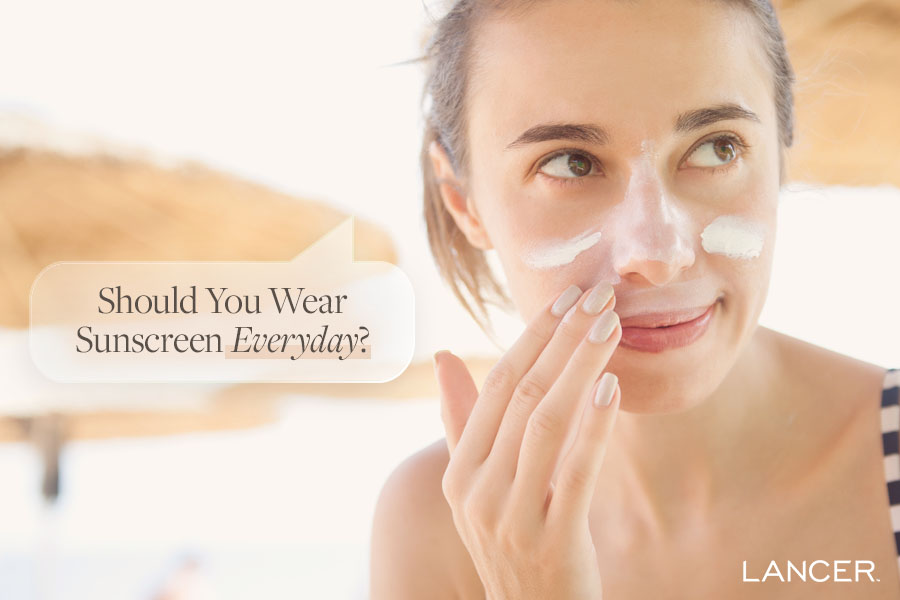
Should you wear sunscreen every day?
The answer to the question “Should you wear sunscreen every day?” is a big yes! Wearing sunscreen every single day is one of the most important things that you can do to prevent skin cancer and premature signs of aging such as wrinkles and fine lines.
The American Academy of Dermatology recommends that everyone over six months of age, both children and adults, apply sunscreen to their exposed skin every single day. (Babies under six months of age should be protected from UV exposure as much as possible.) At Lancer Skincare, we offer two different anti-aging sunscreens so you can choose the perfect one that you will want to apply every single day.
Should you wear sunscreen indoors?
You may be wondering whether or not you need to apply sunscreen if you spend most of your time indoors, such as working in an office with few windows. While you may not feel like you’re getting a lot of sun exposure if you spend most of your time inside, you are in fact exposed to the sun through windows and walking outside. Even just a few minutes of sun at a time accumulates throughout the day, having significant effects on your skin. So even if you spend almost all of your time indoors, then you should absolutely be applying on screen every day.
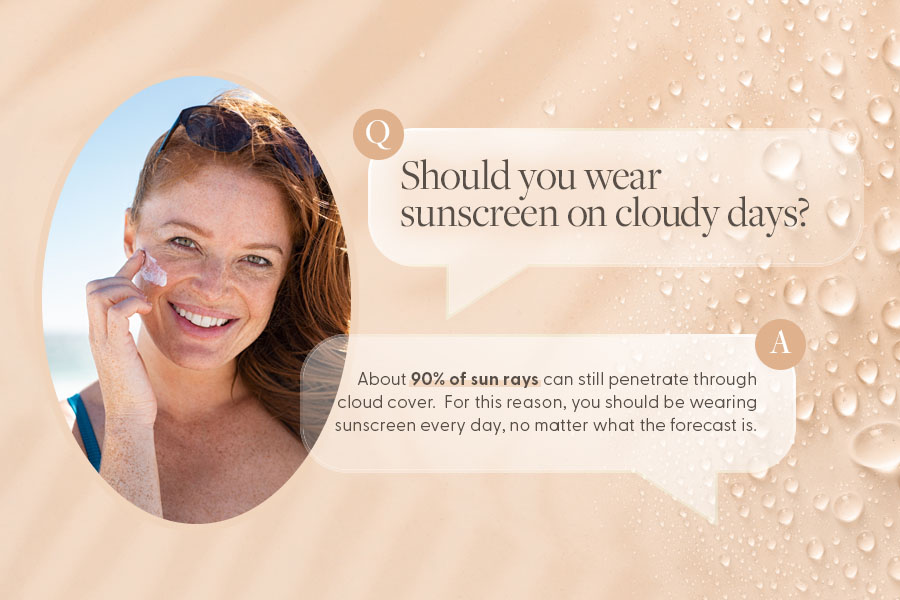
Should you wear sunscreen on cloudy days?
It makes sense that you would need to wear sunscreen on a bright day with little to no cloud cover. But how about a cloudy day when the sun is mostly obscured? Even though you may not be able to see the sun’s rays as much on a cloudy day, about 90% of sun rays can still penetrate through cloud cover, causing UV damage to your skin. You also never know when the cloud cover will clear, exposing you to bright sun rays that can cause a sunburn. For this reason, you should be wearing sunscreen every day, no matter what the forecast is.
Should you wear sunscreen in the winter?
Most people associate sunscreen with long hot days spent at the beach or by the pool during the summer. Because of this, they reason that they don’t need to apply sunscreen in the winter when they are spending most of their time indoors, it’s cold outside, and the weather is bad.
While it may feel weird to apply sunscreen when it’s cold outside, you do need to apply it every day even in the winter. You are still getting sunlight exposure through winter windows and whenever you walk outside. And if you are a big snow sports person, the sun reflecting off the snow can intensify the sun rays and cause sunburn even in the middle of winter. So be sure to apply sunscreen if you’re going skiing or snowboarding!
When should you apply sunscreen?
Sunscreen should be applied first thing in the morning as the final phase after your 3-step skincare routine. First, you should wash your face, and then apply all of your serums, eye creams, and finally your anti-aging moisturizer. After applying your moisturizer, and letting it soak in, but before applying any makeup or other cosmetic products, cover your face in a layer of sunscreen and allow it to sit down for 10 to 15 minutes. This will give the sunscreen enough time to set down so that it doesn’t interfere with the application of foundation or other cosmetic products. This probably goes without saying, but you don’t need to apply sunscreen at night, since the sun isn’t out then.
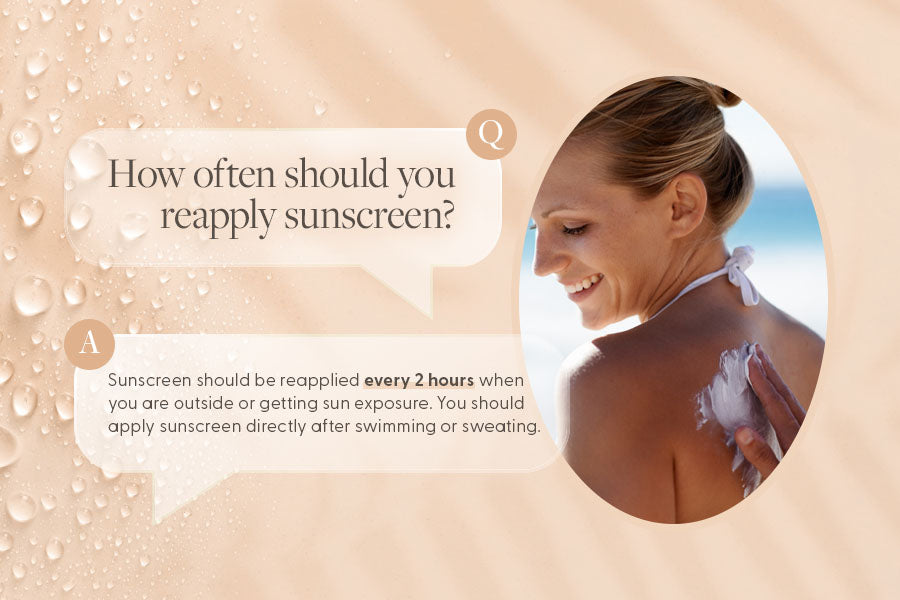
How often should you reapply sunscreen?
As a general rule, sunscreen should be reapplied every two hours when you are outside or otherwise getting a lot of sun exposure. You should also apply sunscreen directly after swimming or sweating, as the moisture will wash away the sunscreen and compromise that protective layer, even if the sunscreen is water resistant.
If you struggle to apply sunscreen over your foundation, you can use a makeup sponge to lightly blot it on top of your makeup instead of smearing it with your hands. You may want to get a travel tube of sunscreen that you can keep in your purse or bag, to make it more convenient to apply during the day. You should also consider getting a lip SPF, and applying it multiple times throughout the day after eating or drinking in place of a regular lip balm.
Explore All of Our Quality Skincare Products
How much sunscreen should I apply?
Very few people apply the full recommended amount of sunscreen, so they aren’t getting the full protection advertised on the bottle. For your face and neck only, you should apply about 1/4 of a teaspoon, which works out to approximately a nickel-sized dollop. When applying sunscreen all over your body, such as when you are at the beach in a swimsuit, you need to apply one ounce, which is the equivalent of two tablespoons, about the size of a small shot glass. When applying sunscreen, be sure to apply it to often forgotten areas, such as your scalp, ears, and the tops of your feet.
Why is wearing sunscreen every day important?
We’ve already written a whole blog on the benefits of sunscreen, but we’ll recap briefly here to explain why wearing sunscreen every day is so important. First of all, wearing sunscreen every day lowers your risk of skin cancer by between 40% and 50%, depending on the type of cancer.
Wearing sunscreen also helps to prevent sunburn and its painful side effects. SPF also protects against premature aging, such as fine lines and wrinkles, since damage from UV rays breaks down collagen and elastin and accelerates this process. Because wearing sunscreen protects your skin from UV damage, it also reduces inflammation and redness and can help blemishes and cuts heal faster because of it.
It also helps to prevent hyperpigmentation and excessive melanin production, which can be triggered by exposure to UV rays. Finally, sunscreen can offer minor cosmetic benefits and enhance the appearance of your skin, even as it protects against sun damage.
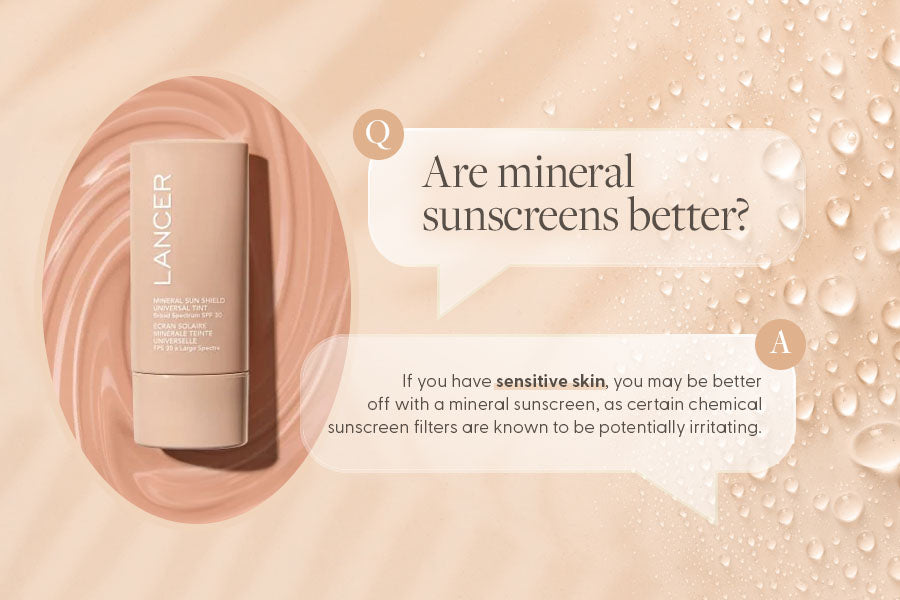
Are mineral sunscreens better?
As a clean beauty movement took off, mineral sunscreens got a lot of attention as being better for you and the environment. This led some people to claim that mineral sunscreens are better than chemical sunscreens and you should never use a chemical sunscreen. However, these claims are greatly exaggerated, and most people can use either a mineral or a chemical sunscreen without issue.
If you have very sensitive skin, you may be better off with a mineral sunscreen, as certain chemical sunscreen filters are known to be potentially irritating. You can also try out a hybrid mineral-chemical sunscreen, which combines zinc oxide and octinoxate for a sheer formulation that absorbs almost instantly.
Does makeup or moisturizers with SPF count?
Many makeup and moisturizer products now advertise themselves as containing SPF, leading some people to think that they can ditch their sunscreen altogether and just use these other products to get some UV ray protection. Unfortunately, most of the sun protection in these products is quite low, between SPF 5 and SPF 15, when you need to be wearing sunscreen with at least SPF 30 every day.
It also typically takes a very large amount of product to get to the advertised SPF even though it’s quite low — far more anti-aging moisturizer or foundation than you would typically use. While using other skin care or cosmetic products with SPF already incorporated can be a nice way to boost your sun protection, it is no replacement for a standalone sunscreen that is specifically formulated to provide sun protection as opposed to cosmetic benefits.
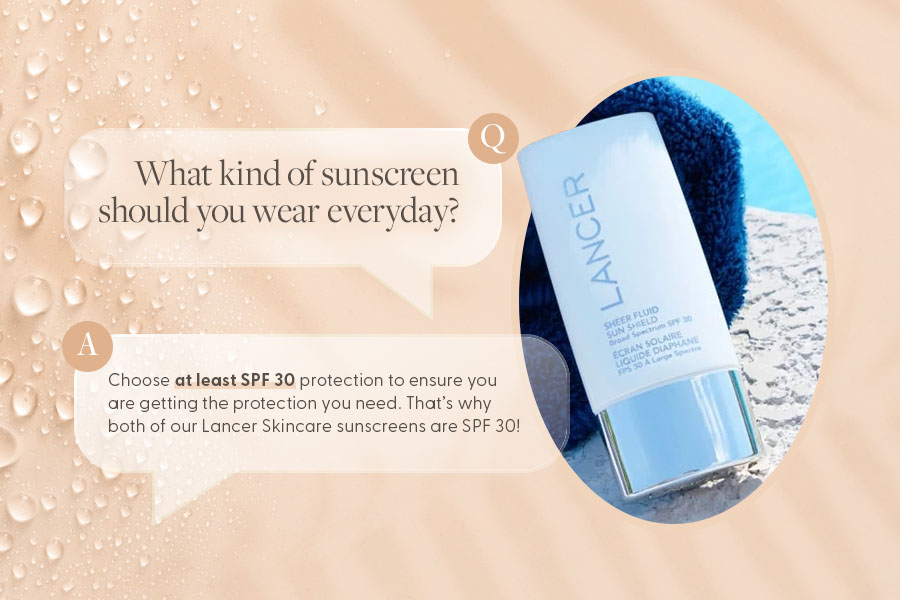
What kind of sunscreen should you wear everyday?
Ideally, you should choose a sunscreen with at least SPF 30 protection in order to ensure that you are getting the protection you need. That’s why both of our Lancer Skincare sunscreens are SPF 30! You should also look for broad spectrum sunscreen, which will protect your skin against both UVA rays and UVB rays. The sunscreen should absorb quickly and it shouldn’t pill up on your face, which will make re-application difficult throughout the day.
If you tend to sweat a lot, or are planning to get in the water, you will also want to look for a sunscreen that is labeled water resistant or very water resistant.
How to choose sunscreen to wear everyday?
There are more sunscreen options on the market than ever before, which can make choosing a sunscreen to wear every day an overwhelming process. When trying to pick a new sunscreen, keep the general guidelines we outlined above in mind. You should also consider your own preferences and skin type when shopping for sunscreen.
For example, someone with more oily skin will probably want a sunscreen that has more of a matte finish and dries down very quickly, while someone with dry skin might want a more moisturizing sunscreen that has a texture more like a lotion than a gel. It’s really important to find a sunscreen that works well with your unique skin and that you will look forward to applying every single day so that you won’t be tempted to skip your daily sunscreen.
Ready to find your new favorite sunscreen? Try our Mineral Sun Shield Universal Tint or our Sheer Fluid Sun Shield, both of which offer SPF 30 broad spectrum protection. While you’re at it, consider adding some other Lancer skin care products to your cart. All of our products ship free within the United States, and they come with a 30-day money-back guarantee, so you can try out our sunscreens and return or exchange them easily if they don’t work for you. Order today to start wearing sunscreen and protect your skin from the sun!
Image Credits
Ekaterina_Klishevnik/Shutterstock.com
Zinaida Zaiko/Shutterstock.com
Tymonko Galyna/Shutterstock.com
Ground Picture/Shutterstock.com
PeopleImages/Shutterstock.com
 PREVIOUS (What Is Gravityl? Everything You Ne...)
PREVIOUS (What Is Gravityl? Everything You Ne...) NEXT (How Long Does It Take for Skincare to Wor...)
NEXT (How Long Does It Take for Skincare to Wor...)